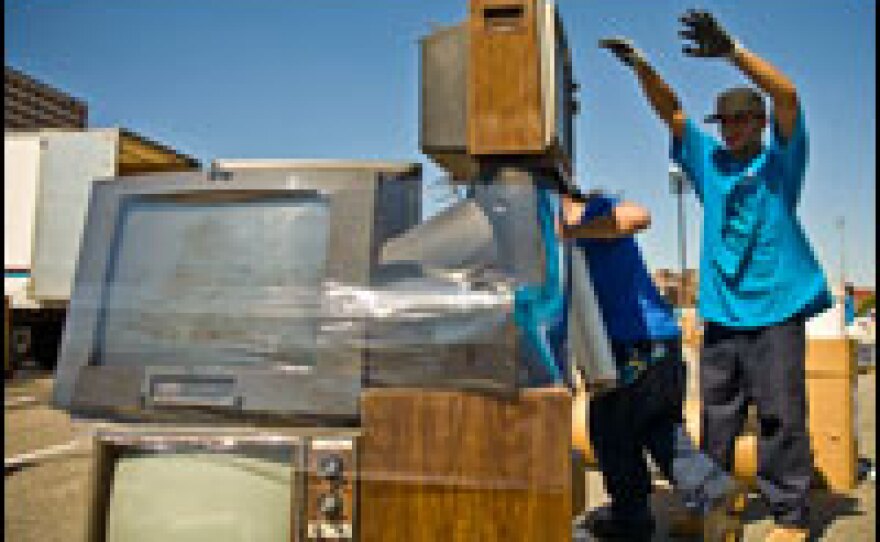

With the U.S. government announcing on Sunday that it would take over Fannie Mae and Freddie Mac, public attention shifted to questions close to home. How would the bailout affect average taxpayers and home buyers? What would the final cost be?
Those are big concerns, but the domestic repercussions may be eclipsed by those overseas. That's because Fannie Mae and Freddie Mac play central — if quiet — roles in maintaining the U.S. position in the global economy. The system is at once incredibly complicated and surprisingly simple.
Consider the scene Sunday in one Brooklyn, New York, parking lot. Even as Treasury Secretary Henry Paulson was unveiling the federal takeover of Fannie Mae and Freddie Mac, consumers in New York City were carting old appliances to an electronics recycling drive in Coney Island.
Anita and Eric Posen showed up with a printer they no longer wanted. It looked fairly new. "I have a new printer," Anita Posen said. "That's why I got rid of this one."
Asked where they thought it was made, the couple guessed China and admitted to purchasing their new printer with a credit card.
The Posens' printer joined the massive piles of computers and TVs and printers — something like 60,000 pounds of equipment, a public sanitation worker estimated. The city holds several drives like this one each year.
Much of this stuff, probably most of it, was made in China. The U.S. buys a lot more from China than China's consumers buy from America each year. Because of that gap in trade, China ends up with about a billion new U.S. dollars every day.
What do the Chinese do with all that money? They lend it back to the U.S. so Americans can buy more from them. China doesn't just give Americans credit cards or a bank loan. Instead, one of the main ways China lends that money to the U.S. is by buying bonds issued by Fannie Mae and Freddie Mac. The agencies were set up solely to help Americans get cheaper mortgages, but they've become key parts of the global economic system.
What Goes Around
The recycling drive was right next door to the down-on-its-luck Coney Island carnival arcade, where Howie Montebillanco was running a game called Kentucky Derby. Players try to throw rubber balls into little holes; the balls roll out, and the players throw them in again.
"The more balls you get in, the quicker your Kentucky Derby horse advances," said Gina Quatrocchi.
The ways in which Fannie Mae and Freddie Mac help recyle U.S. dollars back from China can seem very abstract. But Quatrocchi saw an analogy in the Kentucky Derby game. Imagine the balls are trillions of dollars, and players are throwing them over to China. That's the trade deficit. But the balls, or dollars, come right back, she said, "so we can buy more things we can't afford."
With her boardwalk analogy, Quatrocchi nailed a concept that must have been on federal regulators' minds. However painful the bailout might be, surely Treasury Secretary Paulson was thinking about how much tougher it will be for the U.S. if China doesn't have Fannie Mae and Freddie Mac in place to recycle Americans' dollars.
Copyright 2022 NPR. To see more, visit https://www.npr.org. 9(MDAzMjM2NDYzMDEyMzc1Njk5NjAxNzY3OQ001))






